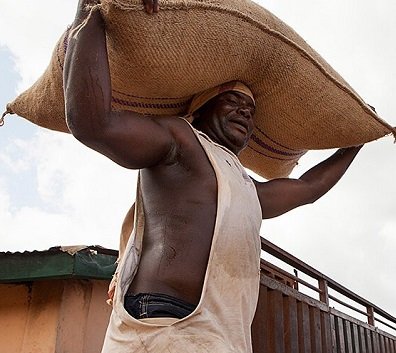Editorial
Cocoa carriers diverse better

Dear Editor,
I wish to revisit the disturbing report about the wages/income of cocoa carriers, which came up early January this year.
The ‘loading boys’, as some are called in local parlance, had embarked on strike demanding an increase in their loading fee from 0.62Gp to GH¢ 1.00 per bag but their employers insisted 0.82Gp instead.
Their action resulted in bags of cocoa piled up at some collection points, causing the Cocoa Marketing Company (CMC) to rely briefly on the labour of prison inmates.
Although the boys returned to work after negotiations, I cannot fathom why young engaged on this field should be paid so low. It appears those in charge of this sector want us to believe that GH¢ 1.00 per a bag of cocoa beans is too much to ask for.
Even if the price per bag reaches GH¢ 1.00, it would imply that a carrier would to have to cart 1000 bags of cocoa beans in order to earn One Thousand Cedis (GH¢ 1000), if my table-top calculation is anything to go by. But considering the current 0.82 Gp rate, they may have to carry more than 1000 bags to earn any substantial amount.
This unfavourable condition, I believe, reflects of the sorry state of our economy and the poor living standards of many Ghanaian workers. It is, indeed, demoralising that a privileged few make themselves richer at the expense of ordinary employees who are paid paltry sums.
Cocoa carriers, diverse better and the government must have a second look at their situation. A bag of cocoa beans could weight about 64kg and carrying such load is no child’s play.
Frank Asare Donkor,
Ejuisu.
Editorial
Don’t use polythene bags to store hot, oily foods
Ghanaians have been advised to refrain from putting hot or oily foods in plastic bags because it poses major health risks.
The warning states that storing hot foods in polythene bags, especially ones that are not made for food storage can cause dangerous chemicals to leak into the food, which could be dangerous for one’s health.
Professor Esther Sakyi-Dawson, an Associate Professor of Food Science at the University of Ghana, gave this warning at a World Food Safety Day celebration in Accra on Tuesday.
With the theme “Food Safety: Science in Action,” this year’s World Food Safety Day focused on the critical role that scientific knowledge plays in guaranteeing food safety and fostering confidence in the food supply.
According to Prof. Sakyi-Dawson, when plastics are heated, toxic substances can seep into the food, contaminating it and raising the risk of several chronic illnesses, including hormone imbalances, reproductive problems, and even some types of cancer, which are on the rise in the nation.
According to estimates from the World Health Organisation (WHO), food contamination causes over 400,000 deaths annually and 600 million foodborne illness cases.
Also, a third of all deaths worldwide are caused by foodborne illnesses, which affect at least 91 million people in Africa each year. Of these, 40 percent are in children under the age of five.
Given the concerning statistics, there is an urgent need to raise awareness that eating hot foods like banku, rice, waakye, or “koko” (porridge) wrapped in plastic is extremely harmful to one’s health.
It is more important to avoid putting food in black plastics, which are not food quality and are typically used for carrying items. Similarly, white polythene should not come into close contact with food.
Despite the warning, Ghanaians have been urged to watch out for food-grade plastics, which are frequently thick, to use for food packing and storage as needed
Since “to be forewarned is to be forearmed” The Spectator advises consumers to put their health first by making the appropriate choices about what they put into their bodies for their own safety.
Editorial
Ensure safety of children during rainy seasonfacilities

Dear Editor,
I write to express concern about the safety of school-going children during these unpredictable weather conditions.
Many children walk long distances to get to school on roads which are mostly poorly drained.
Also, the combination of low visibility, slippery surfaces, and increased vehicular traffic during rains presents real risks to their health and safety.
While I urge local authorities to improve road infrastructure and pedestrian protections around schools, I wish to especially appeal to parents and guardians to take proactive steps in safeguarding their children during this season.
Parents should ensure their children are dressed properly in waterproof or warm clothing, including raincoats, boots, and umbrellas where possible.
Also, parents should accompany younger children to school when it is raining or overly windy, or arrange for responsible adults to do so.
Again, I urge parents to teach their children basic road safety and help them identify the safest routes to school.
In my view, I think it will be prudent to delay leaving the house when rain is heavy or visibility is poor, even if it means arriving at school later and safer.
It is important to remember that safety begins at home. While schools and government agencies have a role to play, parents and caregivers, must not leave the protection of our children to chance.
I believe that with shared responsibility between the state and the family, avoidable accidents could be prevented and ensure every child makes it to school and back home safely.
Abui, Korle Gonno






